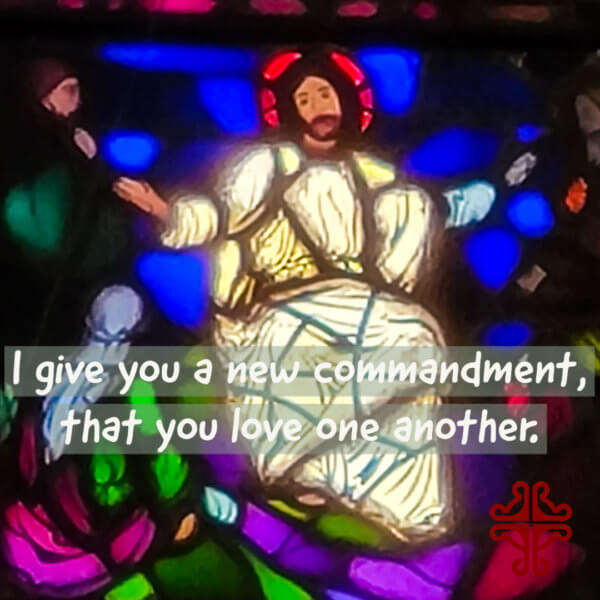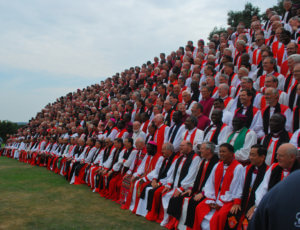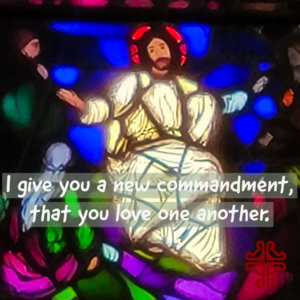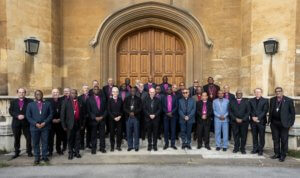
Love One Another
I’ve been thinking a lot over these past weeks about our community, both here at Emmanuel and as it spreads, like ripples on a pond, throughout the world. While we were tying ribbons on the church fence during Lent, many of us wondered — me too, actually! — how we would weave all those different colors, widths, lengths, and textures of ribbon into an altar cloth for Eastertide. I can’t tell you that the cloth on which we bless and break our communion bread is not bumpy, or that it hangs perfectly square. Yet still, we are all woven into the fabric of our community as, in the words of George Wallace Briggs, one church united in communion blessed.
 The Lambeth Conference is coming up in England in July. The Archbishop of Canterbury is inviting the 883 bishops of the global Anglican Communion into conversation about how we can be God’s Church for God’s World in the 21st century. How does this affect us at Emmanuel? Our call as Christians is to love one another as Jesus loved us. All of us. Our global communion represents Anglicans — called Episcopalians in the United States — from 41 provinces in 168 countries. Like our altar cloth at Emmanuel, we are all different colors, widths and textures. We speak different languages, and come from different ethnic, religious, political, environmental, and geographic contexts — each of us made in the image of God and woven into the fabric of our communion. Just like our bumpy, wavy altar cloth, our differences across the communion make us versatile and resilient when we’re woven together. I am always surprised and delighted to remember that the average Anglican, taking into account our numbers across the communion, is a 25-year-old African mother. We could learn some things about church vitality and growth from our friends in Africa.
The Lambeth Conference is coming up in England in July. The Archbishop of Canterbury is inviting the 883 bishops of the global Anglican Communion into conversation about how we can be God’s Church for God’s World in the 21st century. How does this affect us at Emmanuel? Our call as Christians is to love one another as Jesus loved us. All of us. Our global communion represents Anglicans — called Episcopalians in the United States — from 41 provinces in 168 countries. Like our altar cloth at Emmanuel, we are all different colors, widths and textures. We speak different languages, and come from different ethnic, religious, political, environmental, and geographic contexts — each of us made in the image of God and woven into the fabric of our communion. Just like our bumpy, wavy altar cloth, our differences across the communion make us versatile and resilient when we’re woven together. I am always surprised and delighted to remember that the average Anglican, taking into account our numbers across the communion, is a 25-year-old African mother. We could learn some things about church vitality and growth from our friends in Africa.
Difference is Tough
 But difference is tough. It’s easiest for us to love those who live like we do, sound like we do, think like we do, believe like we do, love like we do, and look like we do. From our own positions in our own unique contexts, we see different things — and we see the same things in different ways. Different things affect our environments and how we feel. And yet, Jesus’ message in John’s gospel is clear: I give you a new commandment to love one another, Jesus tells them. Just as I have loved you, you also should love one another.
But difference is tough. It’s easiest for us to love those who live like we do, sound like we do, think like we do, believe like we do, love like we do, and look like we do. From our own positions in our own unique contexts, we see different things — and we see the same things in different ways. Different things affect our environments and how we feel. And yet, Jesus’ message in John’s gospel is clear: I give you a new commandment to love one another, Jesus tells them. Just as I have loved you, you also should love one another.
Notice Jesus doesn’t limit this commandment to those in our family, those we like, or those who agree with us. Love is an active verb, and loving is tough work. We are called to love — and be loved by — those with whom we disagree — even when we can’t understand why they feel the way they do. This is Peter’s marvelous epiphany in our reading from Acts this morning, when he realizes God has given new life to everyone and not only to those who look like, think like, and his friends back home in Galilee. Just like any community, we are of as many minds as our own individual contexts. Our call to love one another — hospitality — translates from the Greek as a call to love those who are strange to — or different from — us. Our opportunity is to meet that difference with curiosity, and to wonder what we can learn from each other.
Call for Reconciliation
I have had the privilege over the past month of serving on a team preparing the Call for Reconciliation, one of the nine post-Lambeth Conference action steps. I am the lowliest and the least among archbishops, bishops, and cathedral deans in this very distinguished ecclesial company. Just like we wondered during Lent how all those different ribbons could be woven into one cloth, it’s easy to wonder why it matters to us at Emmanuel to meet with all of these Anglican strangers from around the world. On our early Friday morning call this week, today’s gospel message unfolded for me in real time, showing me again what it means to love those who are different from us, and just why God wants us to do it.
I had prepared the draft for our discussion, selecting the verses from 1 Peter, our text for the Lambeth Conference, from which to explore our call for Reconciliation. I gave a short explanation of my thought process in selecting the verses. (In case you’re reading 1 Peter later on today, I had offered up the part from Chapter 2 Once you were not a people, but now you are God’s people; once you had not received mercy, but now you have received mercy). We talked among ourselves on this international, multi-lingual, transAtlantic, multi-continent Zoom, speaking from our own little boxes on the screen, like the celebrity contestants on Hollywood Squares.
 Then, in a lull in the conversation, one spoke, beginning very quietly. I hope you can be patient with me as I try to speak, our colleague said. My English is fine, but my spirit is not, he said. He explained that he had grown up in Apartheid in South Africa, later working alongside Desmond Tutu when they knew as they entered into religious leadership that their own and their families’ very lives were at stake. Imprisonment and soul-crushing indignities — like having to step off the sidewalk to allow white people to pass — were the small worries. Serious bodily injury and death for themselves and their families were daily outcomes of belief and integrity in their context, and peace without truth, justice, and reparation was not reconciliation, but a continuation of the oppressive system of Apartheid.
Then, in a lull in the conversation, one spoke, beginning very quietly. I hope you can be patient with me as I try to speak, our colleague said. My English is fine, but my spirit is not, he said. He explained that he had grown up in Apartheid in South Africa, later working alongside Desmond Tutu when they knew as they entered into religious leadership that their own and their families’ very lives were at stake. Imprisonment and soul-crushing indignities — like having to step off the sidewalk to allow white people to pass — were the small worries. Serious bodily injury and death for themselves and their families were daily outcomes of belief and integrity in their context, and peace without truth, justice, and reparation was not reconciliation, but a continuation of the oppressive system of Apartheid.
In my context a bishop’s crozier needs to be a spear sometimes and not a shepherd’s crook, my colleague said. And then there was more: It is difficult for me to have the confidence to join the conversation. I shrink from whiteness inside — the confidence of whiteness. Both male and female whiteness, he added. UHHH. He was talking about me. I wasn’t the only woman on the Zoom, but I was the only white woman. At the very moment when I was feeling lowly and insignificant as a priest from a small Episcopal Church in the smallest US state among these giants of the Anglican Church, my colleague’s context gave him a very different experience of our interaction.
What happened next? We just kept talking — my colleague gentle, kind, gracious, forgiving. And me — understanding more after he generously shared his perspective — feeling compassion, remorse, and deep respect, as we both took a turn through God’s love toward new life. God calls us to love one another as God has loved each one of us, as different as we all are, and as different as we can possibly be. And if it’s easy — because we only engage with people who look like us, and think like we do, how do we know we’re loving actively, every single day?
I told you last week that we have received a $7,080 grant for Soup’s On, to allow us to buy lighter weight tables that are easier to move, and also to provide stipends to some of our guests to help out at the meal. Some of them are former restaurant workers, out of work after the pandemic. Helping out as hosts can give them dignity, and also re-credential them for restaurant work. And Friday, the McBean Foundation awarded us $180,000 to repair and protect the chapel windows and re-caulk and re-seal the roof. We were not given such a generous grant because we are a worthy and pious historic Episcopal Church with really nice worship services.
We were given this marvelous grant specifically because McBean loved what we are doing in community — our collaboration with Newport Classical, and our intentional invitation to the whole community to join us here. We were given the McBean grant AND the RI Foundation Grant for Soup’s On because of our hospitality — our intentional welcome of those who are different from us. Imagining what active love like that looks like in God’s Church in God’s World is a powerful way to dream of God’s possibilities at Emmanuel. God has done marvelous things. Amen
